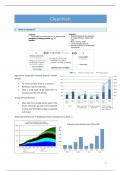Cleantech
1. What is cleantech?
Agricultural production demand forecast (million
tonnes)
• For most countries there is an increase
• Nonfood: crops for materials…
• Land is a big issue → we expect this to
increase over the next decade.
Energy demand forecast
• More and more energy will be used in the
future, shares for gas and oil are expected
to drop, but renewable energy is expected
to increase
Water demand forecast → dubbling of water demand (China, Brazil…)
1
,2. The food – energy – water nexus
Nexus = a connection or series of connections linking two or more things, a central or focal point.
Example for the water-food-energy nexus: wastewater treatment,
biofuels
The water nexus: water for food and electricity
Big water demand now and in the future, a lot of it is related to
irrigation, and much related to manufacturing and is expected to
increase. But also, for energy production.
Energy demand and water
In US: the water sector represents 4% of the energy usage
Small fraction goes to abstraction and conveyance; the end user is the largest share. Water at home and water
production/distribution play a big role in the water nexus
Energy demand in the household
More than 1/3 of energy demand in the house is water related. 30% for heating,
12% cooling and 12% for warm water
2
,Water use for energy production.
Thermal power cooling water: big cooling towers which needs to cool
water.
Energy-food-nexus:
• 1-2% of global energy used to synthesize NH3 for fertilizer
production via the Haber Bosch process
Learning objectives:
• Describe the process of carrying out life cycle analyses for
industrial processes and buildings.
• Remember principles of treatment, recovery and
production processes for food, water and energy.
• Criticize water treatment and recovery processes according to
• sustainability criteria.
• Remember principles of sustainable engineering of buildings (urban environments). Criticize
construction and energy performance of buildings (urban fabric).
Course evaluation:
• Exam (closed book) 80% of grade
o Open-question
o Multiple-choice
• Written individual assignment 20% of grade
• Both assignments need attain a passing mark to pass the course!
3. The nexus in the context of sustainability
3.1 The nexus – from system thinking to system engineering
Systems thinking is a management discipline that concerns an understanding of a system by examining the
linkages and interactions between the components that comprise the entirety of that defined system.
3
, Systems engineering is an interdisciplinary approach and means for enabling the realization and deployment of
successful systems. It can be viewed as the application of engineering techniques to the engineering of systems,
as well as the application of a systems approach to engineering efforts. Systems engineering integrates other
disciplines and specialty groups into a team effort, forming a structured development process that proceeds
from concept to production to operation and disposal. Systems engineering considers both the business and
the technical needs of all customers, with the goal of providing a quality product that meets the user needs.
3.2 Beyond the nexus → sustainability
The water-food-energy nexus already is a concept to aid system thinking and sustainable development. But is it
enough…?
The water-food-energy nexus is only one of many sustainability concepts!
Indeed the water nexus cannot be applied without knowledge of other sustainability concepts, otherwise
problems may be shifted to other sustainability domains or solutions may never be implemented.
So let us look at some other sustainability concepts…
“Sustainable development is development that meets the needs of the present without compromising the
ability of future generations to meet their own needs.”
Therefore…
• Sustainability is about continuous function of our planets
ecological and socio-economic system.
• This can only be achieved through reuse or recycling of resources
(but where, when and how is often the question)
• Buzzwords: (bio)-regeneration, circular systems, closing the loop,
bio-economy…
Strong and weak sustainability
• Weak: swap around these capitals (environmental, society and
economy) → all equally important
• Strong: environment above society and economy, and society
above economy.
The difference between the two
• Weak sustainability is a concept within environmental economics, which states that human capital can
be a substitute for natural capital.
• Strong sustainability, argues that critical natural capital cannot be replaced or “substituted” by other
forms of capital (human or economic). In other words: …different types of capital (economic,
ecological, social) should be independently maintained, in real physical/biological terms.
o Human capital is the stock of knowledge, habits, social and personality attributes, including
creativity, embodied in the ability to perform labor so as to produce economic value.
o Natural capital is the world's stock of natural resources, which includes geology, soils, air,
water and all living organisms.
o Economic capital includes finance, manufacturing, production, and physical infrastructure
4




